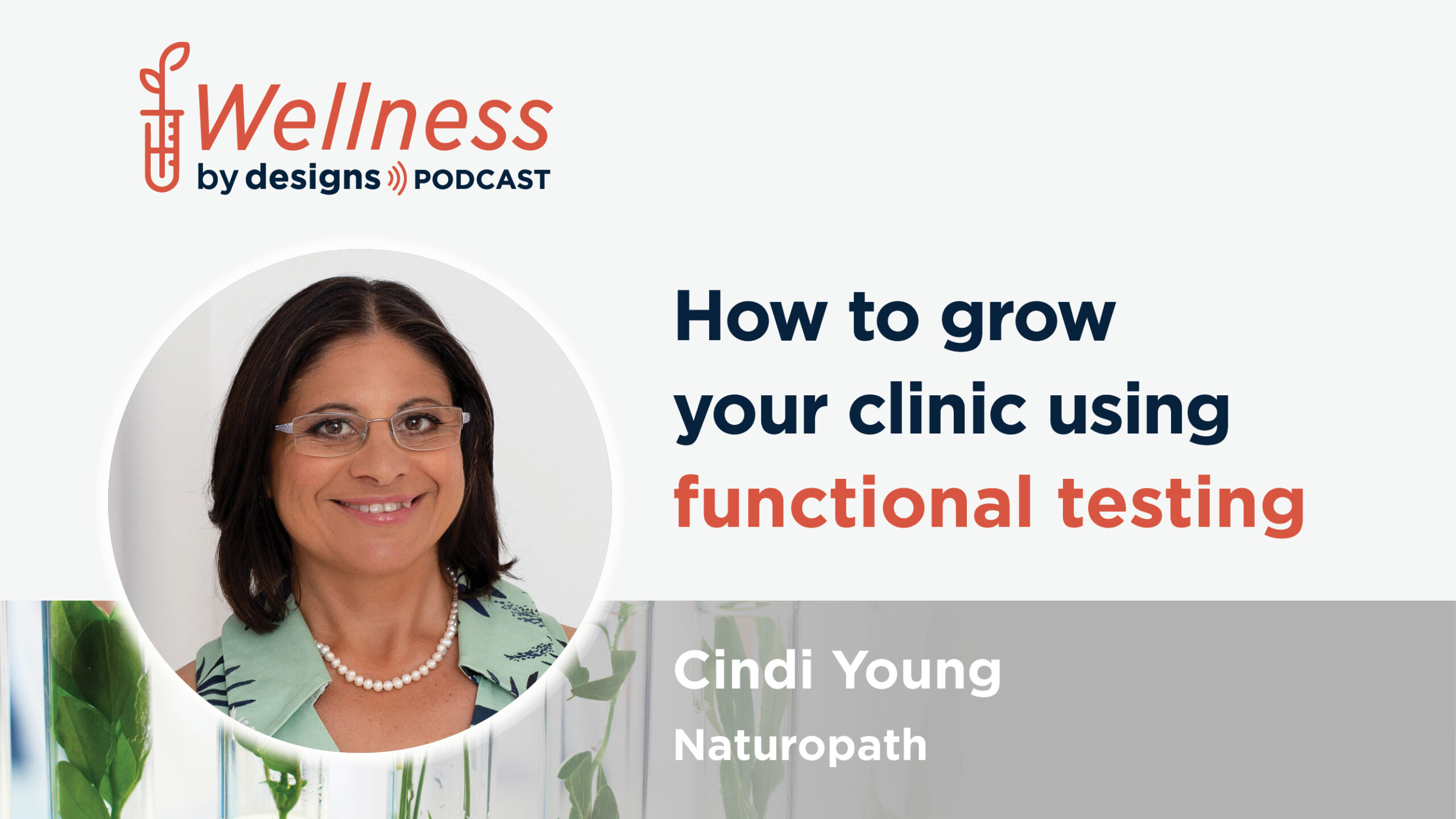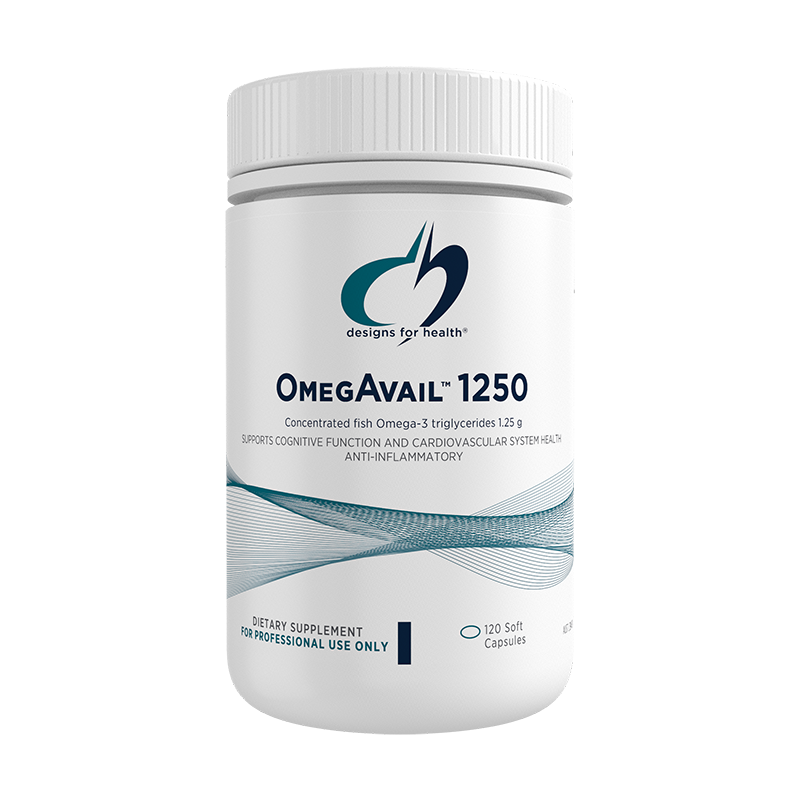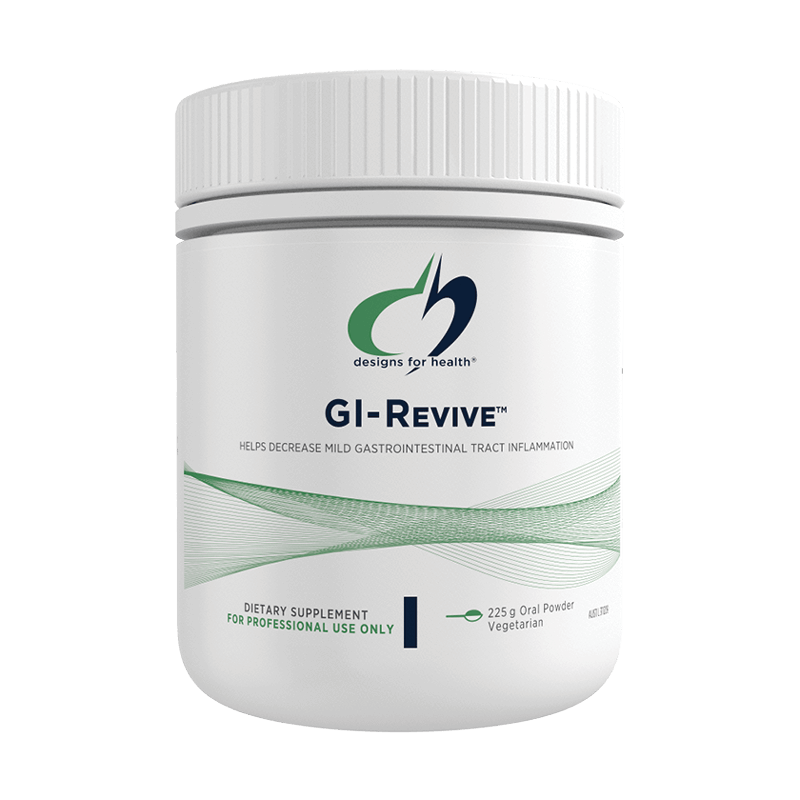
Discover functional testing’s untapped potential with experienced naturopath Cindi Young, who will illuminate its transformative powers for patient health and practice growth.
This episode is filled with insights for health practitioners looking to elevate their approach to chronic conditions and patient care. Cindi takes us through her personal evolution from a sceptic to a proponent of functional testing, sharing the pivotal moments that changed her perspective and how it has since bolstered her patients’ healing journeys.
Get ready to be equipped with practical advice on seamlessly incorporating functional testing into your naturopathic clinic, convincing patients of its value, and making it an investment rather than a cost.
As we highlight the connections between conditions like scoliosis and gut health, Cindi emphasises the importance of being meticulous and informed when interpreting test results.
Whether you’re a seasoned practitioner or a student, this episode will leave you with a deeper understanding of functional testing and its role in crafting a more precise and confident healing strategy for diverse patient populations.
About Cindi:
Cindi Young has over twenty-two years of industry experience with a Bachelor’s Degree in Health Sciences and extensive postgraduate studies in women’s health and weight management. She has extensive experience in clinic settings, running two busy clinics on the Gold Coast & in Northern NSW. She has experience across the industry teaching undergraduate programs and practitioner education support. She is a highly experienced practitioner with a focus on evidence-based medicine. She brings together traditional understandings alongside comprehensive information gathering, including patient assessment and testing.
Cindi completes a range of testing as part of her practice, including pathology testing, in-house and functional testing, depending on what the patient is experiencing. This allows Cindi to create the most personalised treatment plan based upon exactly what is going.
She is an experienced practitioner with a special interest in:
– Hormone imbalances, including reproductive, thyroid and adrenal issues, fertility & IVF support, pregnancy health & post-natal care.
– Weight management support Cindi is an accredited Metabolic Balance Practitioner offering the Metabolic Balance Program in clinic or online Australia-wide
Connect with Cindi:
Website: cindiyoung.com.au
Shownotes and references are available on your local Designs for Health website
www.designsforhealth.com.au
Register as a Designs for Health Practitioner and discover quality practitioner-only supplements at www.designsforhealth.com.au
Follow us on Socials
Instagram: Designsforhealthaus
Facebook: Designsforhealthaus
Transcript
Introduction
Andrew: Welcome to “Wellness by Designs.” I’m your host, Andrew Whitfield-Cook, and today we’re chatting with Cindi Young, a naturopath who has grown successful clinics. Today, we’re going to discuss how functional testing can build your business. Welcome to “Wellness by Designs,” Cindi. How are you?
Cindi: Hi, Andrew. Thanks. I’m great.
Andrew: Now, first, Cindi, tell us a little bit about your history and how you practice
Cindi: So, I graduated in 2001, and was really fortunate to land in my first clinic, where I was mentored and taught about the importance of testing in my clinic. I resisted at first, but then I got my head around it all, postgraduate, and I’ve got two clinics, on the Gold Coast and in northern New South Wales, and I use and incorporate a lot of testing in both of those clinics.
Andrew: Are these metro or urban-situated clinics, or are there any suburban clinics that you have?
Cindi: One of them, so, the one in northern New South Wales is regional. So, it’s in a regional town, regional center. And then, on the Gold Coast, it’s, I guess, more urban. So, in a suburb on the Gold Coast. Yeah.
Andrew: Okay. So, I guess that where I was leading there was socioeconomics. Some people will say, “Ah, you know, I can’t afford testing. It’s expensive and it detracts from what I want to therapeutically use.” You’ve got a different way of looking at that though, right?
Cindi: Yeah. I think that it’s our job to offer our patients options, in terms of finding answers and solutions. So I don’t approach either of those demographics any differently. I really put it in their hands, and allow them to make the choice, not me to make that choice for them.
Andrew: And so, the actual use, or implementation of functional therapeutics…functional testing, forgive me, how do you approach that? How do you broach that with your patients? Do you say, “Listen, we need to find out what the landscape is first,” or do you weave it in another way?
Cindi: So, based on assessment with the patient, I, if it’s a long-standing, say, gut issue, as an example, and they’ve been to 10 different practitioners, and they’ve done all the medical testing, and I absolutely put it on the table, and I suggest that we need to look at some functional gut testing, so that we can actually know what we’re dealing with, and to take the guesswork out of it. I think that a lot of people become frustrated and disgruntled with the process because they’re not getting any answers, they’re not getting any solutions, so I really put it to them that the testing is going to give us the clearest roadmap of what we need to do to help them. So, it gives them real confidence in, I think, me as a practitioner, but also in the process, that there is actually a test that we can do that will do that.
Andrew: And so, let’s go into the testing that you incorporate. What tests do you tend to use most commonly, and which ones have the greatest bang for buck?
Cindi: So, I do quite a bit of in-house testing, so I’ve got a few different testing tools that I use in the clinic, bioimpedance, blood screening. I utilize pathology testing as well, from, you know, medical model, but, I guess, functional testing, the areas that I dip into are the gut tests. We’ll use one of the GI tests, and also hormone and adrenal profiling as well. And they’re the ones that I tend to get the most interesting, I think, because I’m so confident in incorporating them into my practice, that they’re the ones I tend to use. But I really do the test… Like, they’re, you know, I might do an OAT test, or I might do a different type of test if it’s needed, but I tend to go for more the gut hormone testing, which is, I guess, the areas that I specialize in.
Andrew: Yeah. Now, you teach people how to test with confidence, but indeed, you come from that background, as you said, that you were quite resistant to testing. Tell us about, if we go back in time, take us back to your mindset back then, and what was it that changed?
Cindi: Yeah, interesting. Good question. I think, new grad, you know, I graduated and then got this role in this amazing practice, and was kind of, in no uncertain way, told, “You have to use testing. We’ve got it here. Yeah, it’s great. You have to use it.” And was taught how to use it, but I just don’t think I understood the value of the testing, because I was like, “I’ve just done my degree. I know what I’m doing. I don’t need a test to tell me anything.” And I also felt like there was a block with charging more for a test that I was offering. So, I think that was one of the biggest blocks, as a new grad. You know, I think graduate, new grads have just come from paying for everything for the years of their study, so it took me a long time to get that confidence with what I was talking about, but also in actually charging for it, and being okay to charge for it as well, because it is a skill, and it is unique, you know, that I think everything that we offer is unique. So, yeah.
Andrew: So, take us through, let’s say, a patient interview. You know, you’re talking there, you’ve discussed the patient history, relevant medical, psychosocial history, and now you want to broach the issue of testing. Do you have any tricks, hints, and tips that you can give us in how to actually broach that with your patients? To get over that fear, for other practitioners.
Cindi: Yeah. And I think it’s really about listening to what they’re saying, and listening to their story, and tuning into that. And I think, in some ways, you need to put your sales hat on, which I know a lot of practitioners that feel really resistant to, but put your hat on, of, “I’ve got this great service, that is part of what I do, and I wanna…I think we need to explore this with you.” So, if you’ve got the confidence in what you’re talking about… I know, when I’m talking to someone, an expert in their field, and they start talking about this great thing, I wanna do it. I wanna have a part of it as well, so I talk about the benefits, you know, the features of the test, and then the benefits to them of that test, so that they’ve got a really great understanding about what is in it for them, what are they gonna get out of this $400 or $500 test, or whichever test it is. So, yeah. It’s not just about me, the practitioner. It’s about them.
Andrew: Yeah. It’s so well-said, but I totally take your point, that if you know more than just what the test is, and what it can do for patients, you have a far greater confidence in recommending that, from the heart, knowing what it will show the patient, knowing what it will reveal. I guess the issue arises, with any testing, I guess, with any therapy, indeed, is, will the pathology merely agree with what your suspicions are? Does it help the patient in any way? Or is it just an extra cost? Or does it change therapy, indeed?
Cindi: Oh, my goodness. I think it absolutely changes the treatment, because sometimes I might be suspecting something, but then, many times, I’m completely blown away by the test result, and go, “Wow. Okay, I didn’t realize,” you know, if we’re talking leaky gut or dysbiosis, “I didn’t realize it was gonna be to this degree, and I didn’t realize that there was so much inflammation, and I, you know, didn’t know the state of your microbiome. You know, I had a good assessment, but I didn’t realize it was completely wiped out.” So, I think it absolutely directs the ability of me as a clinician to give them something that’s gonna work, you know. And so many times, from test results, I can create the perfect treatment, and tell them what to expect over the next two to three months, and that gives them the confidence, but then they, you know, when they come back, and say, “This is the first time I’ve ever been on a gut treatment that’s actually done anything,” so it’s, you know, I think it’s all of us. It’s all of us combined that get the benefit, mutual benefit, out of it, you know?
Andrew: You know, I’m just, I’m thinking about this lady, the other week. And we could have done a gut test. We could have done a functional liver detox test. But what I chose to concentrate on was her cortisol awakening response, because when I looked back, everything that seemed, everything that I was questioning about, seemed to go back and back and back in time, to a stressful event, which continues. And so, I guess part of the expertise, the art of what we do, is to choose the right test. So, how do you teach practitioners which test is the most relevant for the patient?
Cindi: Yeah, that’s a great question. Again, you’ve gotta tune in to your patient. Like, when I’m with my patients, I’m 150% with my patients, and I’m picking up on every look, word, comment, and sometimes backtracking, and going, “You said something about this,” you know. And so, the stress-gut connection, oh my god. So huge. You know, which test to choose, right? Do I go the stress pathway, or do I go the gut pathway? They’re both compromised. So, what’s gonna give us the biggest bang? So, it’s just listening to what they’re saying, and if there’s a huge stress history, or, you know, like, I’ve had people throw in PTSD, and anxiety, and insomnia, and I’m like, “Well, I can’t fix your gut if your nervous system is fried.” So, yeah, it’s really tapping in. And also, explaining to the patient the connections. A lot of the times, they’ve never made these connections. They’ve never had anyone sit and listen for long enough to really make those connections, for them to understand what’s going on. And often, they’ll have those aha moments, where they go, “Actually, my gut issues started when I got divorced,” or when that thing happened, you know, that major event, floods, fires, take your pick. And it will be when you’re talking to them that they actually make those connections, and then they get the reason why you’re talking about doing some further testing. So, it’s just, yeah, listening, and connecting the dots.
Andrew: Yeah. Hear, hear. Indeed. That was this lady’s response. She was blown away, when we went right back, and there was all of this treatments, these points of interceding along the way, but when we went right back, it was, “Oh, my goodness,” so… So, you teach practitioners… Actually, no. Before I do that, I wanna just investigate. You’re talking about the regional area versus the urban areas that you have clinics in. Do you find any difference? And this is me just going off on my own little tangent, but do you find any difference in the types of tests that they benefit from, that patients benefit from? Here’s my thought process. We always think that the country’s more pure than an urban environment, because the urban environment’s congested, and traffic, and things like that. But oftentimes, I’ve seen rural, particularly farmers, can be extremely toxic in their overload. Do you find that that links up? That, you know, these supposedly “clean” regional areas just aren’t that clean?
Cindi: “Clean?” Yeah. Yeah. Gosh. Such a good, interesting question. There’s definitely… I mean, there’s crossover, with both areas, but I do find regional, some of the issues are more chronic. For whatever reason, they’re being missed. And I don’t know what…I haven’t quite figured it out, like, and a lot of them are farmers, with, you know, I’ve got a lady who’s 78. She’s just beautiful. And her husband comes to the appointment, and they’re old, old-school beef farmers. And she’s had major gut, debilitating gut issues for, like, 30 years, and it’s scoliosis. And I’m like, has anyone ever connected that maybe your scoliosis might have something to do with your gut? But, you know. So, no one’s really looked at it. So I kind of, I don’t know how that happens. I don’t know how that gets missed. I don’t know if it’s because they haven’t, you know, sought attention for it, or… I don’t know what it is, but I do find that there’s a lot of really chronic, long-standing stuff regional.
Andrew: You know, I wonder if it’s because they’re made of stronger mettle than us city folk…
Cindi: They just deal with. Yeah.
Andrew: …and they just get on with the job, you know?
Cindi: Yeah.
Andrew: So, call-outs. What’s your call-out to practitioners who, and I’m gonna say, like yourself, who might have come from college, they’re really unsure about that cost-benefit ratio, with regards to testing. And then also, there’s that huge college, if you like, within itself, of finding out about the functional testing. Because that’s a whole new landscape of learning as well, with many different companies offering functional testing now, and there’s so many to avail yourself to. So, what’s your call-out to practitioners, in what to do now that they’re graduated, and where to search for?
Cindi: Oh, my biggest call-out is to not be afraid to do testing, you know. I think that…and you’ve gotta do the groundwork. It’s almost like getting a whole other degree, learning how to interpret some of these tests, you know. I’ve got a folder on my desk at all times, full of the pathology to go through with patients. And, so, but I’ve invested hours and hours and hours into my learning and understanding in that interpretation, and if I don’t know the answer, I find out before I’m sitting in front of that patient, so I am able to be the expert. And I think the best thing to start with is what are you interested in as a practitioner? So, for me, hormones, adrenals, gut are my babies. I just love, you know, treating those areas. So, the obvious choice for me as a clinician was to start looking at all of the different gut tests. And there’s a lot, you know, and picking, what am I looking for? What do I like in a test? What’s gonna give me the biggest bang for my buck, if I’m asking a patient to spend that money on that test, and then to follow through with the treatment.
So, you’ve gotta go through them, and you’ve gotta figure out what’s gonna work best for you and for your clinic, and what’s gonna help you help them the most, so… And you don’t need to do them all. You don’t need to be an expert on them all. You know, I’ve got some people that will ask about a test, and I’ll say, “You know what, I do do it, but I don’t do a lot of that test. I’ll refer you to this person, who is an expert in that test as well.” So, yeah. And I think [inaudible 00:17:46] testing incorporated, it absolutely, I think, just lifts your confidence as a practitioner to be making the right choices. And supplements aren’t cheap either. You know, we are in an expensive part of healthcare, unfortunately, so you’re gonna prescribe, you wanna be 100% confident, not just making an educated decision, which is still good, but the test just puts the icing on the cake.
Andrew: Ah. So, what you’re saying is that by investing in judicial testing, you’re actually hoping to decrease the costs of the patient ongoingly, by helping to select more appropriate supplements for them. Is that correct?
Cindi: Getting it right. You’re gonna get it right the first time. There’s no guesswork, you know. Like, it takes the guesswork out of the treatment. How many times have you given a leaky gut formula for, you know, dysbiosis and gut healing, because you thought that it was absolutely all about healing their gut? And I’ve gotten gut testing back, and the leaky gut markers are really low, and I go, “No wonder that didn’t work.” Like, that, you know. So, I could have kept going with that train of thought for another three months, thinking, “It’s absolutely your gut. I’ve gotta heal your gut.” But the testing will confirm or deny, if it is. So, you get it right. You get the treatment right.
Andrew: So, you… Yeah. And you mentor students through this, about it, not just how to test, but how to grow their business through functional testing. So, with regards to taking somebody through the actual process, the actual, here’s your pen, here’s the paper, write a request. Getting the patient to complete that test. Do you take students through this, holding their hand until they can go, “Let go. I’m competent in that sort of arena, and I can do this myself.” Because I’m not sure how much they’re taught during college.
Cindi: I don’t think they’re taught enough, to be honest. Like, and I know, certainly when I went through my degree, a million years ago, testing was not even spoken about, right? Like, we didn’t even talk about [inaudible 00:20:09] Like, we talked a little bit about pathology, but not really. And the students that I’m seeing come through now, mentoring, they, like, I’ve had undergrads sitting in when I do a GI map interpretation, and they are literally, like, blown away by the information, and, you know, just can’t believe that we can find that out. So, yeah, it’s…yeah. So, I love, I love mentoring students to get the confidence in applying it, and using it, and not being scared. It’s all fear. Half the reason why people aren’t doing it is because they’re scared, “And what if I make this patient spend $500 on this test, and I got it wrong?” So then we don’t do it. So then we’re, you know, frozen by not doing.
Andrew: Cindi, just to follow on from what you’re saying, I do remember, many decades ago, when orthodox medicine was really out to get functional testing. And there was a few damaging articles saying it was worthless and things like that. What I note with quite interest is that, let’s say, 10 years ago now, I was speaking with an endocrinologist, very eminent in his field, and he mentioned N-telopeptides. And I was going, “Well, what?” So, this is a functional test to check for bone turnover. And it was absolutely lambasted by orthodoxy, many, many decades ago. And what do you know? Now it’s used by orthodoxy. And I think this is an interesting evolution, that as the research and the benefits of some of this functional testing gains ground, that it’s actually going to be embraced by orthodoxy, and that these tests are gonna be ordered by orthodox practitioners, let alone complementary medicine, or integrative medicine practitioners. So, that gives us some confidence as well.
Cindi: You know, I’m… Yeah, I actually have quite a few doctors and other practitioners referring back to me for testing now. So, they, I’ve spoken to the… Some of them, I haven’t met. I’ve spoken to them on the phone. But they refer patients, and they say, “Go and see Cindi. She’ll do some testing. She’ll figure out what food you need to eat. She’ll figure it out. She’ll figure out what’s going on. Whatever she says, just do it.” So, that…
Andrew: Right.
Cindi: …it’s already happening, now. Which is great, right? It’s amazing.
Andrew: So, if there’s one call-out, to get into functional testing. But I think that comes from your confidence as well, in, as you say, you’re being 150% present for that patient. And I think that is key. That is key, to your presence as a practitioner as well.
Cindi: It definitely helps. People wanna be heard and feel cared for.
Andrew: Cindi, thank you so much for taking us through this. It’s a very important topic. Obviously, there’s so much more to know from…you’ve gotta delve into it, and as you say, hours and hours, days and nights, to really understand the functional testing, different companies that are offering it, where they differentiate, and how it can benefit you and your patient, in finding the answer for them. So, thank you so much for taking us through functional testing today on “Wellness by Designs.”
Cindi: Thanks for having me.
Andrew: And thank you, everyone, for joining us. Remember, you can find all the show notes, and we might put up a few tidbits, a few of the interesting tests that are out there, so that you can gain some more information. But you’ll find them in the show notes. You can find all the other podcasts on the Designs for Health website. I’m Andrew Whitfield-Cook. This is “Wellness by Designs.”








 Exploring Integrative Dentistry with Dr Ron Ehrlich
Exploring Integrative Dentistry with Dr Ron Ehrlich Essential Insights into Gallbladder Function and Care with Amie Skilton
Essential Insights into Gallbladder Function and Care with Amie Skilton Natural Strategies for Men’s Health with Naturopath Jason Mallia
Natural Strategies for Men’s Health with Naturopath Jason Mallia